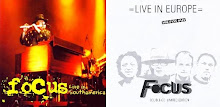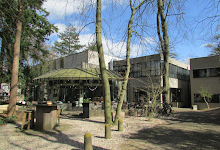Today's official website boasts of Focus as De ultieme progressieve rockgroep. But are they really a prog rock band? Being interviewed last year Thijs Van Leer said “I know some rock musicians call us ‘The Godfathers of Progressive Rock’, but I describe the music as songs without words. It is influenced by European classical music, R’n’B, folk and jazz. It’s very much improvisational and has a signature all of it’s own.”
Progressive rock has been described as “an ambitious, eclectic, and often grandiose” form of rock music that evolved in the late sixties and early seventies as part of a “mostly British attempt to elevate rock music to new levels of artistic credibility.” Pushing “rock's technical and compositional boundaries” it went beyond the standard rock or popular verse-chorus-based song structures. Additionally, arrangements often incorporated elements drawn from classical, jazz, folk and world music. Instrumentals were common.
Prog rock developed from psychedelic rock as part of a wide-ranging tendency in the rock music of the era to draw inspiration from ever more diverse influences. Prog rock reached the peak of its popularity in the 1970s but continues to this day. The term became widespread in the mid-1970s and was applied to music by bands such as King Crimson; Yes; Genesis; Jethro Tull; Camel and was often applied to Focus. Is it appropriate? Perhaps it is best to answer yes and no.
Progressive rock has been described as “an ambitious, eclectic, and often grandiose” form of rock music that evolved in the late sixties and early seventies as part of a “mostly British attempt to elevate rock music to new levels of artistic credibility.” Pushing “rock's technical and compositional boundaries” it went beyond the standard rock or popular verse-chorus-based song structures. Additionally, arrangements often incorporated elements drawn from classical, jazz, folk and world music. Instrumentals were common.
Prog rock developed from psychedelic rock as part of a wide-ranging tendency in the rock music of the era to draw inspiration from ever more diverse influences. Prog rock reached the peak of its popularity in the 1970s but continues to this day. The term became widespread in the mid-1970s and was applied to music by bands such as King Crimson; Yes; Genesis; Jethro Tull; Camel and was often applied to Focus. Is it appropriate? Perhaps it is best to answer yes and no.
Yes
Do Focus avoid common popular music song structures (eg verse-chorus-bridge) or blur formal distinctions by extending sections or inserting musical interludes, often with exaggerated dynamics to heighten the contrast between sections? Yes.
Are classical forms often inserted or substituted, sometimes yielding entire suites, building on the traditional medleys of earlier rock bands? Again, yes.
Do Focus avoid common popular music song structures (eg verse-chorus-bridge) or blur formal distinctions by extending sections or inserting musical interludes, often with exaggerated dynamics to heighten the contrast between sections? Yes.
Are classical forms often inserted or substituted, sometimes yielding entire suites, building on the traditional medleys of earlier rock bands? Again, yes.
Do we get extended instrumental passages, marrying the classical solo tradition with the improvisational traditions of jazz and psychedelic rock, leading often to lengthy tracks? That is certainly there.
There is also distinctive instrumentation and tone colour with the use of flute and lute and limited experimentation with unusual keyboard sounds.
What about the exploration of time signatures other than 4/4 and tempo changes, inspired by classical, jazz, folk and experimental influences? Once again, it is yes. The freer rhythmic approach of prog rock is certainly there too.
Similarly, when it comes to melody and harmony the blues inflections of mainstream rock are supplemented by jazz and classical influences. Longer, developing passages are more common than short, catchy ones. Allusions to, or even direct quotes from, well-known classical themes appear.
There is also distinctive instrumentation and tone colour with the use of flute and lute and limited experimentation with unusual keyboard sounds.
What about the exploration of time signatures other than 4/4 and tempo changes, inspired by classical, jazz, folk and experimental influences? Once again, it is yes. The freer rhythmic approach of prog rock is certainly there too.
Similarly, when it comes to melody and harmony the blues inflections of mainstream rock are supplemented by jazz and classical influences. Longer, developing passages are more common than short, catchy ones. Allusions to, or even direct quotes from, well-known classical themes appear.
No
On the other hand, ambient soundscapes and theatrical elements are not really part of the Focus scene and although Focus showed some interest in new electronic musical instruments and technologies, it was never to the fore. Mellotrons and synthesisers were used sparingly and in its current incarnation Focus pretty much avoids them. There has never been a Focus concept album either. The general lack of lyrics has also meant that themes from classical literature, fantasy and folklore (the stuff of many a prog rock band) have never been explored. Album art has never been a big part of Focus's appeal, either and as for stage theatrics the very opposite was generally true of the quiet Dutchmen. Unlike Genesis, Keith Emerson and others, for Focus the music is everything.
A qualified answer is necessary, therefore. Are Focus Prog rock? Yes, but in a way unlike any other prog rock band. Indeed, a unique style.
On the other hand, ambient soundscapes and theatrical elements are not really part of the Focus scene and although Focus showed some interest in new electronic musical instruments and technologies, it was never to the fore. Mellotrons and synthesisers were used sparingly and in its current incarnation Focus pretty much avoids them. There has never been a Focus concept album either. The general lack of lyrics has also meant that themes from classical literature, fantasy and folklore (the stuff of many a prog rock band) have never been explored. Album art has never been a big part of Focus's appeal, either and as for stage theatrics the very opposite was generally true of the quiet Dutchmen. Unlike Genesis, Keith Emerson and others, for Focus the music is everything.
A qualified answer is necessary, therefore. Are Focus Prog rock? Yes, but in a way unlike any other prog rock band. Indeed, a unique style.





















No comments:
Post a Comment